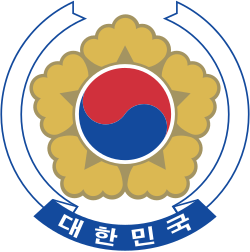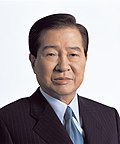| |||||||||||||||||||||||||||||||||||||||||||||
All 273 seats in the National Assembly 137 seats needed for a majority | |||||||||||||||||||||||||||||||||||||||||||||
|---|---|---|---|---|---|---|---|---|---|---|---|---|---|---|---|---|---|---|---|---|---|---|---|---|---|---|---|---|---|---|---|---|---|---|---|---|---|---|---|---|---|---|---|---|---|
| Turnout | 57.22% ( | ||||||||||||||||||||||||||||||||||||||||||||
| |||||||||||||||||||||||||||||||||||||||||||||
 ■ GNP ■ MDP ■ ULD ■ DPP ■ NKPH ■ Others | |||||||||||||||||||||||||||||||||||||||||||||
| |||||||||||||||||||||||||||||||||||||||||||||
| This article is part of a series on |
 |
|---|
Legislative elections were held in South Korea on 13 April 2000. [1]
Contents
Opinion polls suggested that the ruling Democratic Party would win the most seats, but the result was a victory for the conservative Grand National Party (GNP), which won 133 of the 299 seats in the National Assembly. The United Liberal Democrats (ULD) lost two-thirds of their seats due to GNP's victory in North Gyeongsang Province, Gangwon Province, and also fewer local votes in the Chungcheong region.
With no electoral alliance winning 137 seats, the 16th National Assembly was the first without a working majority in South Korean history. [2]
The Democrats, ULD and Democratic People's Party (DPP) formed a coalition to gain a majority. However, the ULD withdrew support in 2001 and joined the conservative opposition. Seven ULD members subsequently defected from the party and joined the GNP, giving it a majority.


